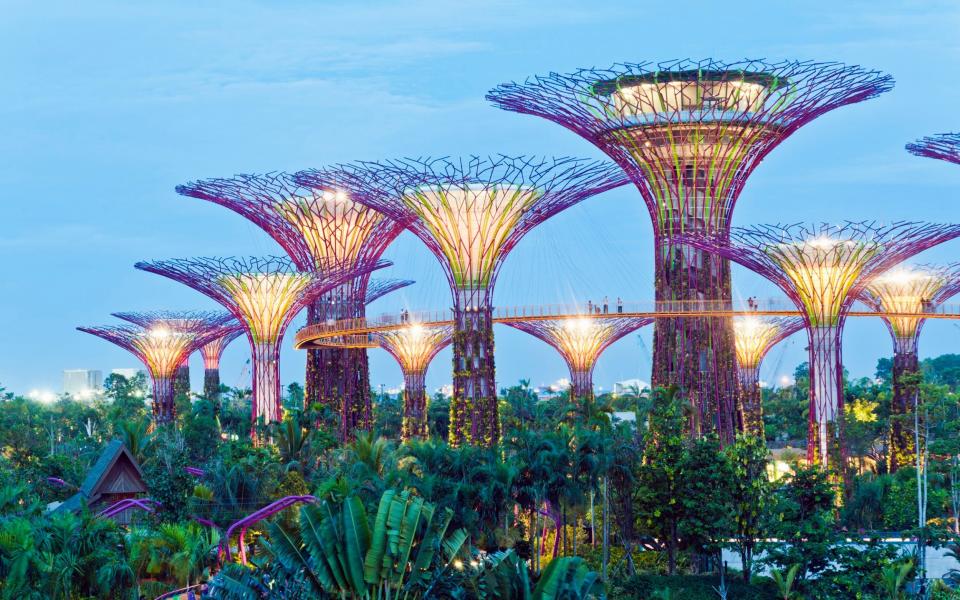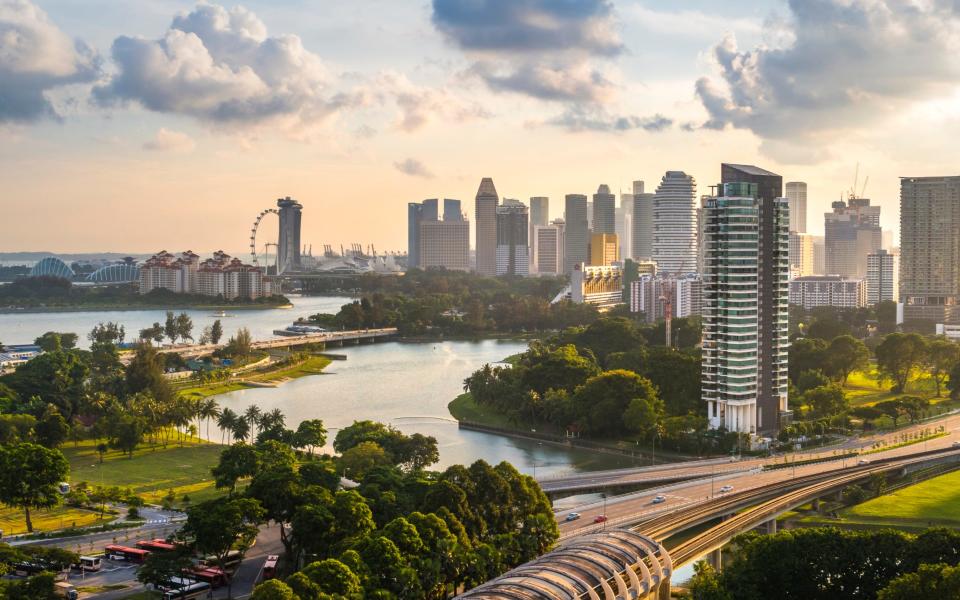Travel to Singapore: latest Covid rules and practical guidance

With 93 per cent of its population fully vaccinated and new cases hovering around roughly around 3,000 daily, Singapore is cautiously reopening to the world as part of its declared intention to “live with Covid”.
It recently launched Vaccinated Travel Lanes (VTL), allowing fully-vaccinated travellers to travel to and from the countries without quarantine, and is progressively adding to a list of VTL destinations, which currently include Great Britain, Brunei, Canada, Denmark, France, Germany, Italy, the Netherlands, the US, Spain and South Korea.
Shops, restaurants and attractions are all open “as normal”, although mask-wearing and social distancing continues to be the rule, and social gatherings as well as dinners at restaurants are currently restricted to groups of two. Roving safe distancing ambassadors (dressed in their trademark red shirts) regularly patrol public areas to ensure compliance, although Singaporeans – while fatigued by long-running pandemic regulations – are generally happy to follow the rules.
Entry to most public places such as shopping malls and restaurants requires the scanning of the TraceTogether token or mobile app, which all travellers are required to use during their stay in Singapore.
With the introduction of a slew of new vaccination-differentiated measures on October 13, life has diverged quite dramatically for those who are fully vaccinated and those who remain uninoculated.
Unvaccinated individuals can no longer dine at hawker centres or markets and coffee shops, enter shopping malls and large standalone stores (except for supermarkets) or visit attractions without a valid negative test administered by a test provider approved by the Ministry of Health. Some exemptions apply, such as in the case of unvaccinated children under 12 years of age.
Can I go to Singapore?
Singapore has formed a Vaccinated Travel Lane (VTL) with the UK. This means only double-jabbed travellers can visit. They must first apply for a vaccinated travel pass with the Singapore authorities, by travel insurance with a minimum coverage of S$30,000 for Covid-19-related medical treatment and hospital costs and travel on one of the designated Vaccinated Travel Lane flights (see below). There’s also mandatory testing and forms to fill out (see below).
Only Singapore residents can enter the country without using the Vaccinated Travel Lane, but may need prior approval and will need to quarantine on arrival and take several tests.
Will I be insured if I go?
According to the FCDO, if visiting Singapore via the VTL you must “buy travel insurance, with a minimum coverage of S$30,000 for Covid-19-related medical treatment and hospitalisation costs. Travellers may purchase travel insurance from Singapore-based or overseas-based insurers.” The FCDO no longer advises against travel to the country, making policies easier to come by. Visitors must have an electronic or printed copy of this policy to show on arrival.
Do I need to take a test before traveling to Singapore?
Yes. All arrivals via the VTL must take several tests. Firstly, a PCR test 48 hours before your departure to Singapore, followed by another PCR test on arrival at the airport in Singapore, which must be pre-registered and pre-paid for.
Do I need to fill in any forms?
Yes. All arrivals must submit health, travel history, and accommodation declarations electronically via the SG Arrival Card, up to 3 days prior to your date of arrival in Singapore, according to the FCDO.

Do I need to self-isolate on arrival?
Not if you’re fully vaccinated. However if you aren’t inoculated and are granted permission to return to Singapore as a resident you will have to quarantine for seven days at a declared address.
Anyone who tests positive for Covid-19 on arrival to Singapore will be issued a “Stay at Home Notice,” and must isolate for seven days at their place of residence or in a hotel, before taking another test on the final day. Everyone aged over 12 who is in home quarantine will need by law to wear an electronic tag for the duration of their quarantine period. The tags are about the size of a watch and are worn on the wrist.
Do I need to wear a mask?
Yes, mask wearing is mandatory in all public areas. The only exceptions are during eating and drinking in food and beverage establishments as well as during vigorous exercise outdoors.
What are the rules on beaches?
Beaches remain open and a popular option for nature-seeking locals, although visitors are restricted to groups of two and masks should be worn unless while swimming or engaging in vigorous exercise.
What are the rules in bars?
Following current measures, no recorded or live music can be played in bars. Only groups of two fully-vaccinated people can dine in, with masks only to be removed while eating and drinking. All sales and consumption of alcohol must cease by 10:30pm daily.
What are the rules for restaurants?
Restaurants follow similar rules to bars (see above).
What are the rules for shopping?
Malls and shops are open although shoppers must be fully vaccinated and are restricted to groups of two.
What are the rules in hotels?
Guests are limited to groups of two, with masks to be worn everywhere except when eating and drinking. Pools, gyms and spas remain open, although some hotels may require guests to pre-book slots to avoid overcrowding.
What are the rules on public transport?
Public transport is a quick, effective way to get around Singapore and masks should be worn at all times. Outside of rush hour, when trains and buses can get unavoidably congested, safe distancing should be followed.

Shall I take cash, or pay for everything on card?
Many places in Singapore accept credit cards and now, thanks to the pandemic, many hawkers (markets) accept contactless QR code payments too. However, it’s still best to carry some cash as many hawkers and market vendors are still cash-only, as are some mom-and-pop-style food and sundry stores.
Do I need to take a test before travelling back to England?
No, not if you are fully vaccinated. If you are not double-jabbed, you must take a lateral flow test 72 hours before arriving in the UK and have an official certificate to prove it. If you fail to do so, you will be denied boarding, or risk a fine of up to £500 on arrival back in the UK. You can find the Government's rules on testing before departure, here.
Do I need to self isolate on my return to England?
Travellers who have received two doses of a coronavirus vaccine can avoid quarantine on their return home, but still need to test on day two. This will be downgraded to a lateral flow test on October 24.
Those who haven't had both jabs must self-isolate at home for 10 days. Singapore is not on the red list, so you are not required to enter hotel quarantine. You will also need to take a PCR test on the second and eighth days of your self-isolation. If you opt in for Test to Release, you can take an extra test on day five to exit quarantine (if your result is negative), but will still need to take the further test on day eight.
How is the case rate in Singapore?
As of October 15, Singapore reported 366.89 cases per 100,000 – a weekly increase of 5 per cent, but still behind the UK’s own case rate.
How is Singapore’s vaccination drive going?
As of October 15, over 94 per cent of the eligible population had received their first dose of a Covid-19 vaccine; 93 per cent are fully vaccinated.

